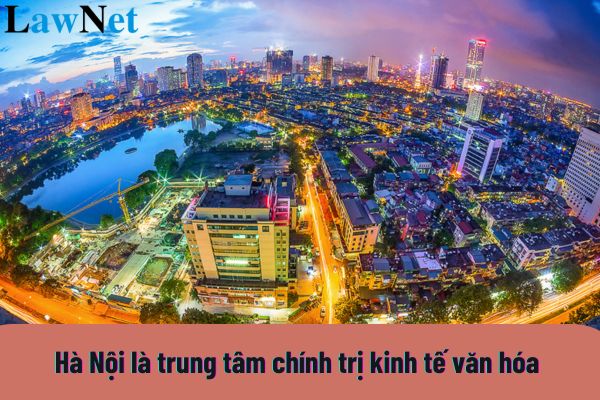Why is Hanoi considered the political, economic, cultural, and educational center of Vietnam? What are essential teaching devices for the subjects of History and Geography in Vietnam?
Why is Hanoi considered the political, economic, cultural, and educational center of Vietnam?
Hanoi is the political, economic, cultural, and educational center of the country because:
- Hanoi is the workplace of central government agencies.
- Hanoi is also an important economic center of the country with many factories, high-tech zones, commercial centers, banking systems, etc.
- Hanoi concentrates numerous universities, research institutes, museums, libraries, etc.
- Hanoi has the most historical and cultural relics in the entire country and preserves many of the nation's traditional cultural values.
Why is Hanoi considered the political, economic, cultural, and educational center of Vietnam?
1. Political center:
Headquarters of state agencies: Hanoi is where the headquarters of central agencies, the National Assembly, the Government of Vietnam, the ministries and central authorities, and high-level political-social organizations of the entire country are located.
Decision-making on major policies: Important political decisions of the country are made in Hanoi.
2. Economic center:
Concentration of many businesses: Hanoi is home to many large economic conglomerates, state and private enterprises, banks, and multinational companies.
Developed infrastructure: Hanoi has a modern transportation and telecommunications system, industrial zones, and newly developed urban areas.
Financial center: Many banks and major financial organizations have their headquarters in Hanoi.
3. Cultural center:
Rich cultural heritage: Hanoi preserves many valuable tangible and intangible cultural heritages of the nation, such as: Van Mieu - Quoc Tu Giam, Thang Long Imperial Citadel, One Pillar Pagoda, ...
Art center: Hanoi has many theaters, museums, libraries, art exhibition centers, and is a place for the exchange of various art forms.
Traditional festivals: Hanoi is also famous for many traditional festivals rich in national cultural identity.
4. Educational center:
Concentration of many universities: Hanoi hosts many prestigious universities and scientific research institutes.
High training quality: Universities in Hanoi produce many talents for the country.
Scientific research center: Many major scientific research institutes are situated in Hanoi, contributing to the development of national science and technology.
In conclusion, Hanoi, with its advantageous geographical location and long history, along with sustained investment in development, has become the political, economic, cultural, and educational center of Vietnam. The city is not only a hub of power but also a convergence of the nation's spiritual, cultural, and intellectual values.
*Note: The information is for reference only./.

Why is Hanoi considered the political, economic, cultural, and educational center of Vietnam? What are essential teaching devices for the subjects of History and Geography in Vietnam? (Image from the Internet)
What are essential teaching devices for the subjects of History and Geography in Vietnam?
Pursuant to section VIII of General education program for History and Geography (secondary level) issued with Circular 32/2018/TT-BGDDT, the minimum teaching equipment for History and Geography subjects includes:
- Wall maps of the curriculum (world, regions, Vietnam) appropriate to the content of each topic for each class and suitable to students' cognitive characteristics;
- General geographic Atlases, continental geographic Atlases, and Vietnam's geographic Atlases, historical maps;
- Models of artifacts, historical paintings, photos, audio recordings of historical figures, ...;
- Natural specimens;
- Pictures (on paper, static and digital images), diagrams, sketches, video clips edited for educational purposes, suitable to the content of each topic;
- Study sheets with sources of historical material; mapping exercises (maps, sketches, charts, diagrams);
- Basic equipment and devices for natural observation (compass, thermometer, hygrometer, barometer);
- Some tools for practical and fieldwork;
- Digital libraries containing resources for History and Geography teaching;
- Educational software.
In regions with conditions, specialized subject rooms should be organized.
The main purpose of using educational equipment is to provide the technical and material basis to organize learning activities, promoting students to actively and creatively explore historical and geographic knowledge.
What must be ensured in evaluating educational outcomes in History and Geography program in Vietnam?
Based on section 7 of General education program for History and Geography (secondary level) issued with Circular 32/2018/TT-BGDDT, the assessment of educational outcomes in the History and Geography program must meet the following requirements:
- The objective of the assessment is to provide accurate, prompt, and valuable information about the level of meeting the required objectives of the History and Geography program and the progress of students to guide and adjust the teaching activities of teachers and learning activities of students.
- The assessment criteria are the required achievements regarding key virtues, general skills, and specific skills in history and geography as defined in the Overall Program and the History and Geography curriculum;
- In addition to theoretical content, it is necessary to enhance the assessment of students' skills such as: working with maps, atlases, charts, diagrams, tables of data, pictures, observing, collecting, processing, and systematizing information, utilizing outdoor learning tools, using technology and communication in learning,...
Assess the ability to apply knowledge to specific situations, not focusing the assessment on the ability to recall historical or geographical knowledge.
- Diversify assessment forms and increase frequent assessments for all students through various forms: assessing through observation of class activities; assessing through academic records, learning products; assessing through reports on learning project outcomes, reports on practical results, presentations about learning tasks. Enable students to participate in the evaluation process of educational outcomes.
- Educational outcomes are assessed both qualitatively and quantitatively through frequent, periodic evaluations, thereby aggregating the overall assessment of students' virtues, skills, and progress.

